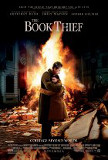Book Thief, The (United States/Germany, 2013)
November 15, 2013
I don't know whether Markus Zusak's young adult bestelling novel The Book Thief should be considered "unfilmable" but the adaptation, written by Michael Petroni and directed by Brian Percival, makes a compelling case that it shouldn't have been filmed. A misfire in far too many meaningful aspects, The Book Thief is so bad that it's tough to decide whether it's better used as a sleep aid or watched while under the influence as an object of derision. Like many wannabe Oscar contenders that wear pretentiousness as a badge of honor, The Book Thief is likely to be lauded primarily by those on the Fox payroll.
The marketing campaign is curious and reveals that there might possibly be something wrong with the movie. The trailer touts this as coming "from the studio that brought you Life of Pi." It's also the studio that brought you Abraham Lincoln: Vampire Hunter and several hundred other films, but who's counting? We're then offered a barrage of laudatory quotes touting The Book Thief as "brilliant", "a major achievement", and "extraordinary", but there's a catch: those quotes are referring to the book. There's not a single positive statement about the movie. Distributors don't have to resort to this sort of subterfuge when they have a praise-worthy production on their hands.
The story, which (as in the book) is narrated by the dulcet tones of Death (Roger Allam), focuses on Liesel (Sophie Nelisse), a young girl living in pre-WW2 Germany whose mother is forced to give up her children. Liesel comes to live with Hans (Geoffrey Rush) and Rosa (Emily Watson), an unremarkable lower middle class couple who are defined by clearly-delineated traits. Rosa is a crusty, unsmiling matron who will eventually show her warm, gooey center. Hans is a nice, all-around guy who teaches Liesel how to read and plays the accordion. Eventually, the non-standard family gets a fourth member: Max (Ben Schnetzer), a Jew fleeing from Nazi oppression. Because Hans owes a blood-debt to Max's late father, Max is provided with food and shelter. Meanwhile, the suddenly literate Liesel develops a hunger for reading and steals books to feed it. She also develops a flirtatious friendship with the boy next door, Rudy (Nico Liersch). However, because this is adapted from a YA source, their relationship never goes beyond asking for a kiss. I guess teenagers in war-ravaged Germany didn't experience sexual longing.
The production design is impressive and John Williams delivers a comfortably familiar sort of score. For the most part, it's easy to believe that events are taking place in Germany circa 1940, although I'm hard-pressed to figure out why so many people are speaking English with funny German accents. This would be easier to discern if there weren't instances when dialogue is presented in subtitled German. You'd think the filmmakers would opt for a little consistency.
The Book Thief wallows in earnestness - to the point where it treads the line separating overbearing drama from self-parody. Director Brian Percival, who is best known for helming a half-dozen episodes of Downton Abbey, shows himself to be tone-deaf when it comes to big screen emotional manipulation. He is unable to provoke the tears he wants because the characters never attain the level of genuineness necessary for their circumstances to move viewers. There's nothing involving about watching The Book Thief. It's a trial, rather long and somewhat tedious.
Sophie Nelisse flashes her blue eyes and offers a winning smile, but her performance is flat and uninvolving. For The Book Thief to succeed, the audience has to identify with Liesel. She has to become real. We have to be invested in her life. None of these things happen. The circumstances are artificial and the performance is wooden. It doesn't help that Nelisse's better-known co-stars, Geoffrey Rush and Emily Watson (two fine actors), are inhabiting caricatures.
The movie addresses life in Nazi Germany in predictable ways. That is to say, the Nazis are all represented as one-dimensional, sneering bad guys. Jews are marched through the streets in an obligatory scene meant to show the inhumanity of the despots. To get even, Liesel and Rudy go off to an isolated lake and shout very loudly that they hate Hitler. Hans tries to defend a Jew because Hans is too good a guy not to stand up to a Nazi bully. The Book Thief's insultingly simplistic and obvious treatment of tragic circumstances is perhaps its greatest sin. The filmmakers' hearts are almost certainly in the right place - there's too much overwrought sincerity for anything else to be the case - but the result is wincingly off-key.
By failing to connect emotionally with its audience, The Book Thief easily overstays its welcome, resulting in numerous watch-checks during the course of its 131-minute running length. Next time Fox wants to tout its involvement in a "prestige" project, it's highly unlikely they'll advertise it by saying "from the studio that brought you The Book Thief."
Book Thief, The (United States/Germany, 2013)
Cast: Sophie Nelisse, Geoffrey Rush, Emily Watson, Ben Schnetzer, Nico Liersch
Screenplay: Michael Petroni, based on the novel by Markus Zusak
Cinematography: Florian Ballhaus
Music: John Williams
U.S. Distributor: 20th Century Fox
U.S. Release Date: 2013-11-08
MPAA Rating: "PG-13" (Violence, Disturbing Images)
Genre: DRAMA
Subtitles: In English and German with English subtitles
Theatrical Aspect Ratio: 2.35:1
- (There are no more better movies of Sophie Nelisse)
- Close (2019)
- (There are no more worst movies of Sophie Nelisse)
- Wah-Wah (2006)
- Synecdoche, New York (2008)
- (There are no more worst movies of Emily Watson)

Comments